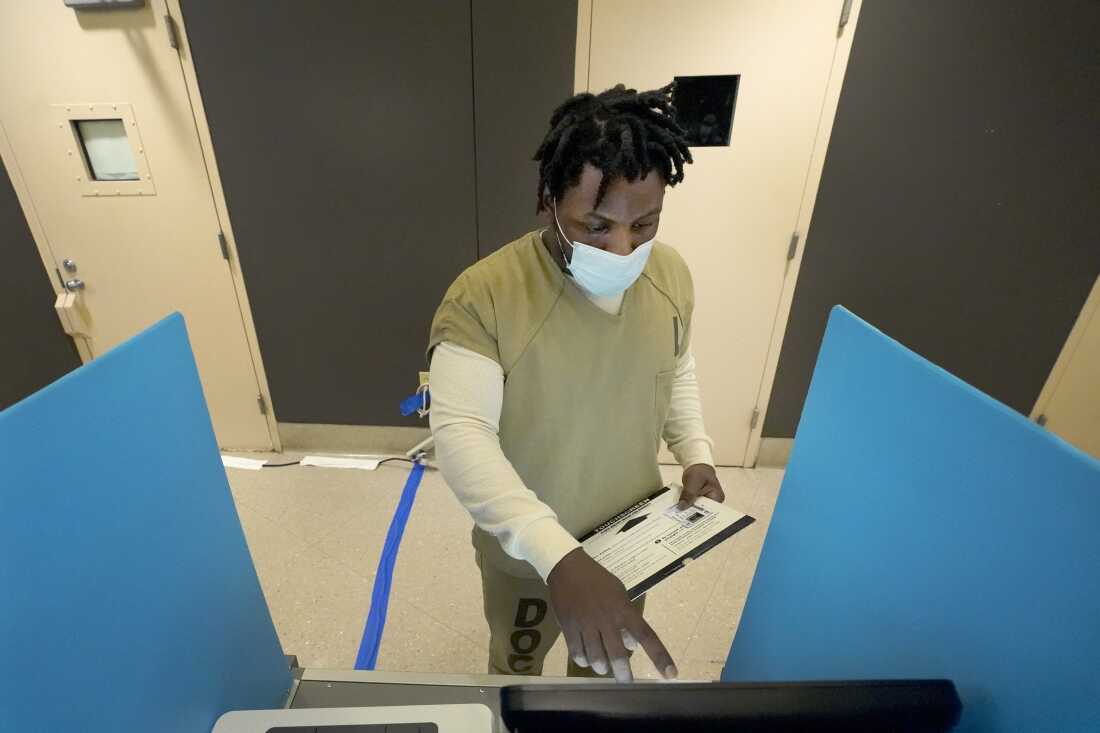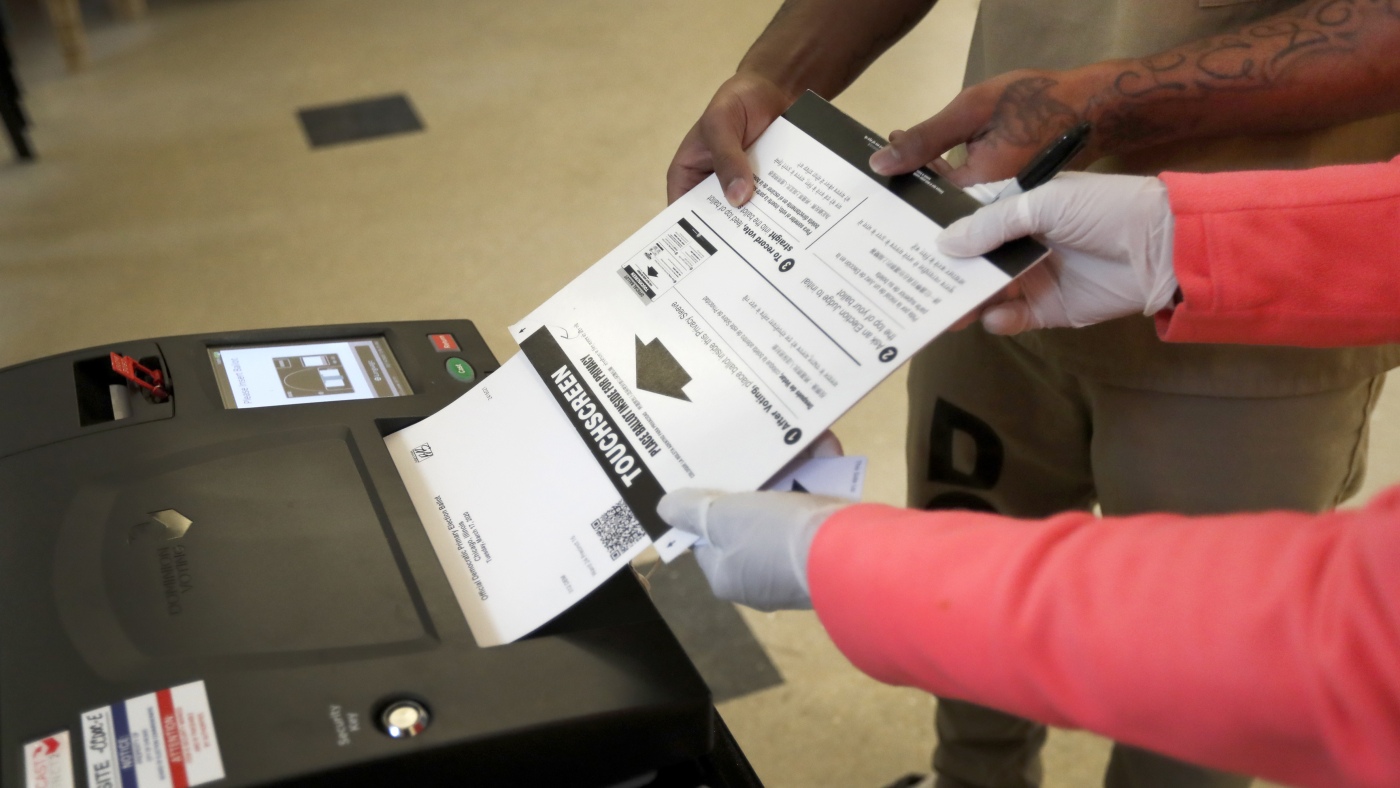Inmates at the Cook County, Ill., jail head to a staging area at the jail’s Division 11 law library before registering and voting in the local election in 2023 in Chicago.
Charlie Riedel/AP
hide caption
toggle caption
Charlie Riedel/AP
Voting in the U.S. is widely considered to be an accessible privilege for all Americans. In reality, voters face confounding rules that change from one state to the next.
Things get especially confusing for the roughly 450,000 people locked up in local jails who haven’t been convicted of any crime and still have the right to vote.
In many cases, even people who have been convicted and are serving time for a misdemeanor or felony, or who have a criminal past, are still eligible to vote.
But just because they have the right to vote doesn’t mean it’s easy or accessible.
“Pretrial detainees are still unconstitutionally being denied access to the ballot simply due to a lot of procedural failures and administrative failures,” said Christina Das, attorney on the Black Voters on the Rise team at the NAACP Legal Defense Fund. “On paper, they have the right to vote, but it is not being actualized.”

A Cook County jail inmate casts his ballot as he participates in early voting during the 2020 Illinois primary at the jail in Chicago.
Charles Rex Arbogast/AP
hide caption
toggle caption
Charles Rex Arbogast/AP
Voting while incarcerated
The U.S. is a patchwork system of state laws where it is up to voters, lawmakers, election administration and funding to allow incarcerated individuals to vote, Das said.
Notably, voting districts have been created around prison populations, many of whom cannot vote — a practice that critics call “prison gerrymandering.”
There are just a few locations in the U.S., like Cook County in Illinois, Los Angeles County and the state of Colorado, where jailed individuals take part in in-person voting.
In many more jails where there is no in-person voting, someone who is newly detained — for example, a day before the Nov. 5 election — would have missed the deadline to request an absentee or mail-in ballot, so “there is no remedy,” Das said.
This person is effectively disenfranchised despite potentially being detained for a crime they did not commit, she said.
“And that is the case happening day in and day out in this country, and, of course, disproportionately to Black and brown Americans due to the systemic biases in our policing system,” she continued.
A few states and territories, including Alabama, Puerto Rico and the Virgin Islands, explicitly mandate that a person who is incarcerated can vote with a regular absentee ballot, says Wendy Underhill, director of elections and redistricting at the National Conference of State Legislatures.
They may have the right, but making it happen is a different matter.

Tykarri Skillon, an inmate at the Cook County, Ill., jail, votes in a local election at the jail’s Division 11 Chapel in Chicago.
Charles Rex Arbogast/AP
hide caption
toggle caption
Charles Rex Arbogast/AP
Realistically, for someone arrested and detained in jail, figuring out how and when to vote will not be the first thing on their mind, Das noted. But for anyone who is detained as an election nears, it is important to get organized and advocate for their rights early on. Here are some tips:
- Inquire about where inmate mail comes in and when. Mail is often delayed and checked by jail officials, so planning for that delay is crucial.
- Check your voter registration status. NPR has a full how-to on voter registration and the important deadlines. Try to determine when absentee ballot applications are available, where they come into the jail and how to request one.
- Ask early how to get an appropriate ID for voting. ID cards and other personal items are confiscated when a person is incarcerated. That can be a problem, especially in states that have strict voter ID laws.“Even when we’re seeing polling places implemented in jail, we’re seeing [voting] numbers that are much less than optimal because individuals don’t have access to their ID,” Das said.In some states, like Texas, jailed individuals can obtain a reasonable impediment declaration stating why they do not have an ID to vote.
- Find ways to stay informed. Inmates aren’t exposed to debates, political ads on social media and TV, or other information from candidates. Because of limits on what can be sent by mail to detention facilities, even paper materials are tough to come by. If Internet access is available, Das recommends that inmates check local county, secretary of state or election commission websites to understand what’s on the ballot and who’s up for election.
Restoring the right to vote
While pretrial detainees retain their right to vote, people who are convicted of felonies generally lose that right for a period of time.
Amelia Armstrong, who is now executive director of the Prisoners Legal Advocacy Network, is a formerly incarcerated person who served time for a felony conviction.
“I experienced firsthand what a devastating loss that was losing my place in society, and how difficult it was upon release to actually find my way back and really regain the opportunity to vote,” Armstrong said.
For people like Armstrong who were formerly incarcerated and are now free, they face a different set of voting obstacles.
In many cases, a felony conviction is no longer an obstacle barring someone from voting — but it can be very confusing with states doing vastly different things from one area to the next.
- In Washington, D.C., Maine and Vermont, people with a felony conviction never lose their right to vote, even while in prison.
- More than 20 states allow people with felony convictions to receive automatic voting restoration upon release from prison.
- More than a dozen additional states mandate that individuals with felony convictions have their voting rights restored only after serving their sentence, finishing probation and after paying outstanding fines or restitution.
- In several locations, individuals lose their voting rights indefinitely for crimes like voting violations — or require a governor’s pardon to have their rights restored.
- The NCSL has more detailed information about state rules for incarcerated or formerly incarcerated individuals with felony convictions.
The biggest barrier Armstrong faced once released was the lack of access to information on what her rights were.
“Even in states where voting rights are automatically restored, very often it’s necessary to re-register, and that is not made clear to most folks. It was certainly not made clear to me,” Armstrong said.
Das recommends people released from prison visit RestoreYourVote.org to determine what the rules are where they live. It’s important for people to get the information first-hand, she says, as even election and state officials have given misleading information to former convicts.
“There’s a lot of misinformation and disinformation about it. At times, states are even sending out voter registration applications to individuals that may not have their rights restored,” she said, “effectively increasing their chances of being falsely criminalized.”
It might’ve been a headache, but Armstrong said getting the chance to cast her ballot again was worth it.
“It was the first time I did not feel like property of the state in almost 10 years,” she said. “There’s something about that vote that is so especially powerful, because it’s a reminder and an embodiment for so many of us, and certainly for me, that we actually are members of this community, that we are people.”







